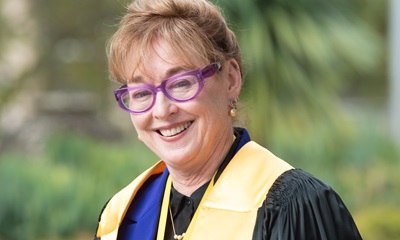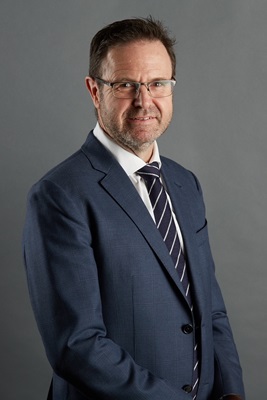2024 | Volume 25 | Issue 2

Becoming a skills course trainer offers many personal and professional benefits and can be an important step towards leadership positions for Royal Australasian College of Surgeons (RACS) Fellows. RACS skills course trainers develop new and valuable skills, network with a multi-disciplinary faculty and build relationships across specialties and levels. They also have the opportunity to share their knowledge with the future generation of doctors and give back to their profession.
Wagga Wagga orthopaedic surgeon and academic Associate Professor Kerin Fielding and Adelaide vascular surgeon Dr David King have reaped significant personal and professional benefits from their experience as skills course trainers over many years.
Associate Professor Fielding originally became involved as a junior consultant 27 years ago, when her husband—an emergency physician—was asked to teach the Early Management of Severe Trauma (EMST) course.
“He did the course and he said, ‘Oh my goodness, you’ve got to do this, you'll love it’.
“I did the trainers’ course, and it was great; there was excellent camaraderie and teamwork, and I really enjoyed it.”
The skills in teamwork and collaboration that she developed as a trainer were particularly important for Associate Professor Fielding in her rural setting, where she was often part of a multidisciplinary team treating trauma patients after road crashes on the Hume Highway between Sydney and Melbourne.
Twelve years ago, she progressed from being a skills course trainer to a course director under the guidance of Alfred Health Director of Orthopedics Department Associate Professor Sue Liew, who served as a role model and mentor.
The opportunity to share knowledge and form relationships across disciplines and career levels is a key benefit of becoming involved in skills course training.
Associate Professor Fielding gains great satisfaction from seeing the impact of her training on medical practitioners in rural areas.
“I have taught a lot of rural GPs, who often work in very small practices, sometimes on their own,” she says.
“It gave me the opportunity to work directly with them during the course and build relationships that were so important down the track when they needed someone who they could contact for support.”
Associate Professor Fielding considers her experience as a trainer to have played a part in her professional pathway towards becoming the president of RACS in 2023.
“I'm absolutely sure that the work I've done with the EMST for so long was one of the reasons why I was nominated to Council eight years ago, and then I was involved in advocacy for rural areas for many years, which led to being asked to chair the Rural Health Equity Strategy.
“One thing leads to another, and I think because of that strategy and then some of the other work I've done on Council, I was voted in as RACS president. I think being a trainer was one of the factors that led me here.”
On a personal level, Associate Professor Fielding has valued the opportunity to contribute to the profession and the skills of doctors.
“We are all in very privileged positions and very well paid, so I'm very grateful to society for giving me the opportunity to be the professional person that I am.
“I think it’s up to all of us to really think hard about giving back and doing this kind of pro bono work; and giving back to the junior doctors who are paying a lot of money for their training is our responsibility.”
The range of RACS skills courses includes surgical skills education and training, care of the critically ill surgical patient, critical literature evaluation and research, early management of severe trauma, and training in professional skills.
The role of skills course trainers is voluntary and can require as little or as much commitment as surgeons can offer—starting as little as just two weekends a year, along with the time taken to prepare course material.
Throughout his career, EMST committee immediate past chair Dr King has adjusted the time he is available to commit to being a trainer according to the different stages of his life.
“Some people might do six or eight courses a year, while others can choose to do one.
“There have been times over the past 20 years when I had small children and I did less, and when things change, you can choose to do more.”
Dr King appreciates the teaching skills he developed through his experience as a skills course trainer.
“I have learnt a lot about the evidence-based educational principles behind adult learning and I use these educational principles outside the skill course whenever I am training students or registrars.
“My lessons are now strategically planned to be engaging and teach knowledge, understanding and application—so much more than just delivering information in a lecture.”
On a personal level, Dr King gains great satisfaction from encountering his past students and hearing how his training has helped them in their careers, and even enabled them to provide assistance in emergencies.
These skills were also valuable to him when he was travelling along a country road towards Kangaroo Island and was the first person on the scene of a car crash.
“The knowledge I gained as a trauma educator gave me skills I could draw on to keep the patient alive until the ambulance arrived, which was about half an hour.”
He also values the management skills that he has developed through being a trainer.
“I was chair of the EMST committee through COVID-19 and we had to work hard to keep the courses running and ensure the doctors were getting trained, while also dealing with restrictions.
“It was satisfying to feel that we were doing something useful while we were in a difficult situation.”

Dr King initially decided to become involved in skills course training on a colleague’s suggestion. “From being something I didn’t necessarily think about doing, it's been such a rewarding experience, with so many good friends and good experiences over the years.
“I would encourage all surgeons to think about becoming a trainer and I guarantee that whether they’re doing a little bit here and there, or getting really involved and joining committees, they’ll get something out of it,” he says.
“In becoming trainers, we are helping prepare our doctors to better look after patients and there's a great sense of satisfaction that comes from that.”
Associate Professor Fielding believes that in the wake of COVID-19, a trainer can provide renewed motivation and inspiration in the careers of surgeons.
“We're aware that everybody has been under pressure since COVID-19—the pandemic really had an unfortunate impact on RACS and people volunteering to do pro bono work.
“Everybody’s tired and fed up with the system, and that lack of engagement has been a global phenomenon that’s nobody’s fault. Sometimes you need some inspiration to get back on track,” she says.
“By joining the family of skills trainers at RACS, you can leave your comfort zone for two weekends a year and find something that you can be really passionate about that will improve and strengthen your career.”